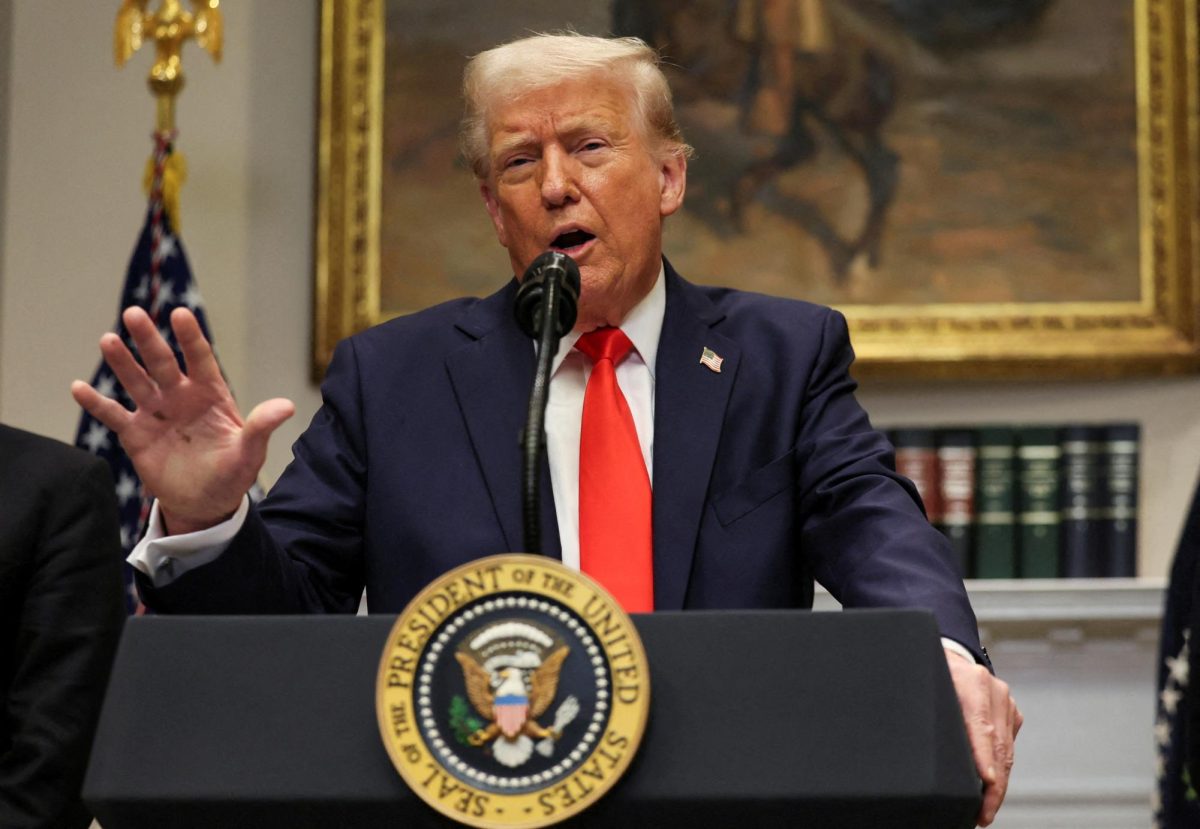INTRO
I support anti-phone policies. I understand the reasoning—phones should be tucked away during class. But during a free period? If I want my phone, I should have it. I don’t need to stuff it in a Yondr pouch. I’m 17; I think I’ve got this under control. Even at 14, I handled it.
I’d like to think of myself as non-rebellious. I’m not the one to play games under my desk or scroll through Instagram in class—honestly, I’m too scared of most of my teachers to risk it. My phone comes out only for practical reasons, like snapping a quick picture of the whiteboard if my contacts are too dry to read it.
Recently, I accidentally left my phone at home before school. After realizing I’d completely botched the timing for my English conference—leaving me ready to cry in bed—I still had a Spanish test to face. The timing couldn’t have been worse.
But it didn’t end there; I couldn’t find my Chromebook, which I needed to take the Spanish test. It was a three-part blunder on a day that wouldn’t give me a break.
I figured I could trade my MacBook for a Chromebook like I’d done with calculators last year. Usually, I’d hear, “We want your phone, but a MacBook will work.”
This time, I faced a different response: “Our policy is that you can only trade in phones. Where’s yours? Go get it.” When I explained I’d left my phone, I was told, “Are you lying to me?”
Really? Why would I lie about that?
So, as I walked to my Spanish class, I tried to puzzle out the logic of it all. If the goal is accountability, does it matter whether it’s a phone or a laptop? Isn’t the whole idea to make sure students come back to return the Chromebook?
You’d think that handing over any valuable item would suffice.
Yet adults seem obsessed with the notion that phones hold all the power for us—more valuable than my MacBook, which is way more expensive and can manage multiple tabs and apps. Meanwhile, my phone has almost no storage, leaving me with hardly any apps, and there’s no way I’m filling out my college applications on it.
Honestly, I love my MacBook, and I hate my phone.
SOCIAL MEDIA IS UNSETTLING, LAUGHABLE AND CONCERNING
I don’t like my phone because I spend way too much time on it, and I spend way too much time on it because of social media.
It’s a problem because I know that these social media platforms are designed to capture our attention and keep us constantly engaged.
With every new feature they introduce, it’s glaringly obvious that their goal is to monopolize our focus. Honestly, I can practically imagine the CEOs smirking as their profits soar. It’s unsettling.
Take Netflix, for instance. A few years back, in 2021, they introduced a “Fast Laughs” tab, filled with short-form clips extracted from longer shows. It’s almost as if Netflix acknowledged that people are less inclined to consume long-form content, so they tried to jump on the short-form social media bandwagon made popular by TikTok (then Instagram, YouTube and even Snapchat).
Another weird feature that made me delete Snapchat a few years back is their “AI friend,” which they have pinned to the top of all conversations. It’s an AI that tries to pretend to be your friend (it has its own Bitmoji, a human avatar).
When it was first introduced, I knew at least two people who texted this AI friend because they were “lonely.”
But it’s just so rooted in capitalism that it’s disgusting. Snapchat tries to lure users in by providing this constant “friend” or support figure. If you don’t want this creepy AI shoved in your face whenever you open the app, you’ll have to pay for a subscription. It’s like they’ve turned basic user control into a luxury feature.
I even remember that for Snapchat, one of the incentives to buy Snapchat+ was that you could see who went back twice to see your story (temporary posts lasting 24 hours). You wonder why Generation Z is called “The Anxious Generation” when stuff like this exists.
Talking about stories, going way back in time, there’s Instagram, which blatantly copied Snapchat’s stories. I check these stories every few hours, even though I can’t remember most of them by the next day.
Even Facebook and WhatsApp have adopted stories. It’s almost laughable.
These platforms are all mirroring one another, pushing short-form content and constant updates to create the illusion that there’s always something new. Frankly, it’s quite concerning.
BUT LET’S TALK BIGGER IMPLICATIONS
Social media is weird, but it’s also harmful. This isn’t accidental. It’s the outcome of a capitalist framework that prioritizes profit over well-being, and we’re its target. I’m a profit. My friends are profits. I see it first-hand.
According to The Wall Street Journal, Meta was aware that social media makes teen girls more insecure but chose not to do anything about it. As a freshman, I knew about this investigation, and as a senior, I have constantly thought about it.
I used to see posts about Asian beauty standards, promoting an unrealistic number in kilograms as the ideal weight for all girls, regardless of height or body type. The number itself is so absurd that I can’t even bring myself to write it out, as I don’t want others to start comparing themselves to such a harmful standard. At times, if that number wasn’t mentioned, there were charts displaying the “ideal” weight next to each height.
Then there are the pro-ana (pro-anorexia) accounts. These accounts actively promote anorexia and extreme thinness by posting cruel and downright vicious posts and comments that I won’t even repeat because they’re genuinely triggering.
But honestly, I also don’t care. I will still use social media despite the risks I know exist because it’s entrenched in every part of my life.
It’s way easier to drop a comment on someone’s post or reply to their stories to maintain some sort of connection, rather than chasing them down via text—or, heaven forbid, through a call or FaceTime (notice how I didn’t even mention in-person meetups? Those barely exist for me anymore, if they’re even relevant at all).
When someone doesn’t text me for a day, I get genuinely uneasy—which is ironic, considering that when people do text me, I feel this rush of anxiety like I need to respond immediately.
Everything is way too much.
WHERE’S THE EMPATHY—NOT JUST THE UNDERSTANDING?
What I can’t get over, though, is how demeaning adults are about their “analysis” of our generation. They characterize us as disconnected, asserting that we lack focus and are dragging down educational standards because our generation supposedly can’t accomplish anything.
Sitting through teachers who are “informed” on Generation Z and trying to make a point that they know everything is incredibly exhausting. Honestly, I prefer teachers who don’t say anything or know nothing rather than those who think they have us figured out.
Teenagers will always find distractions; today’s technology is just another iteration of what has existed.
I already know all the facts about social media and its downsides—trust me, I already know. I don’t care because I already know.
We all know because we’ve lived through it.
We’re navigating a digital landscape designed not by us but by you, the very adults lamenting our mental health crisis.
So, we need accountability from those who run these platforms and empathy from you rather than just analysis.
SO WHAT’S THE SOLUTION?
The broader solution lies in understanding the world we’ve inherited. It is laden with problems—such as climate change and racism—and was shaped by economic interests long before we had phones.
Additionally, while implementing stricter in-school phone restrictions could offer a temporary solution, a more comprehensive approach is necessary to protect teens and children from the potential harms of social media.
Several states have proposed laws to regulate social media use among minors. For instance, Florida’s House Bill 3, set to take effect in 2025, will mandate age verification for social media accounts and restrict certain features for minors. In addition, on Nov. 7, the Australian government announced plans to ban social media for children under 16, with the law to be enacted next year.
Advocating for nationwide policies could be an option for protecting teens and children from social media. However, although having no phones during school could create a “safe place,” it limits student autonomy and creates demeaning tones.
Additionally, by handing my phone over to the district, I’m admitting that I can’t manage my attention, that I’m incapable of focusing or thinking clearly without it, and that it reflects my irresponsibility or lack of self-control.













